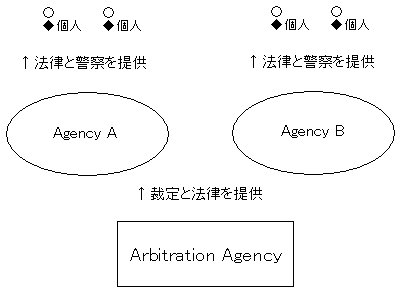|
Law as a Private Good
私的財としての法
Imagine a society with no government. Individuals purchase law enforcement from private firms. Each such firm faces possible conflicts with other firms. Private policemen working for the enforcement agency that I employ may track down the burglar who stole my property only to discover, when they try to arrest him, that he too employs an enforcement agency.
訳: 政府のない社会を想像してみる。個人は民間企業から法律を購入する。(訳者注:ここでいう法律とは law enforcement のことで執行=警察機能をも含む)。
各法律会社は他の会社と常に衝突する可能性がある。
もし強盗がわたしの財産を盗むと、わたしの契約する会社の警察官は犯人をつかまえるが、その犯人もまた別の法律会社(エージェンシー)と契約している。
There are three ways in which such conflicts might be dealt with. The most obvious and least likely is direct violence-a mini-war between my agency, attempting to arrest the burglar, and his agency attempting to defend him from arrest. A somewhat more plausible scenario is negotiation. Since warfare is expensive, agencies might include in the contracts they offer their customers a provision under which they are not obliged to defend customers against legitimate punishment for their actual crimes. When a conflict occured, it would then be up to the two agencies to determine whether the accused customer of one would or would not be deemed guilty and turned over to the other.
訳: このような衝突の問題が解決される方法は3つある。最初に思いつくもので
しかし最も起こりにくそうなものは直接の武力行使だろう。すなわち強盗をつかまえようとするわたしのエージェンシーと、彼を守ろうとする彼のエージェンシーとの間のミニ戦争である。もう少しありそうなシナリオは2社間の交渉である。
戦争は出費がかさむので、各エージェンシーは顧客との契約の中につぎのような条項を入れておくことが考えられる。つまり悪事に対する正当な処罰にかんしては当社は必ずしも責任を負えませんよと。衝突が起きたとき、犯人が有罪かどうか、また犯人を引き渡すかどうかは2社間の話し合いによって決められる。
A still more attractive and more likely solution is advance contracting between the agencies. Under this scenario, any two agencies that faced a significant probability of such clashes would agree on an arbitration agency to settle them-a private court. Implicit or explicit in their agreement would be the legal rules under which such disputes were to be settled.
訳: だが、より魅力的でしかもずっとありそうな方法は、エージェンシー間の事前の契約である。このシナリオのもとでは、衝突の可能性のある2社は、裁定会社(私立裁判所)を通して問題を解決する。そして問題を処理するルールにかんしては暗黙あるいは明示的に合意しておく。
Under these circumstances, both law enforcement and law are private goods produced on a private market. Law enforcement is produced by enforcement agencies and sold directly to their customers. Law is produced by arbitration agencies and sold to the enforcement agencies, who resell it to their customers as one characteristic of the bundle of services they provide.[4]
訳: このような社会においては、法律の執行と法律は市場によって生産される私的財である。法律の執行はその専門エージェンシー(警察)から直接顧客に売られる。
法律自体は裁定会社で生産されて警察に売られる。
警察はサービスの一つとしてそれを顧客に再販するのである。[4]
The resulting legal system might contain many different law codes. The rules governing a particular conflict will depend on the arbitration agency that the enforcement agencies employed by the parties to the conflict have agreed on. While there will be some market pressure for uniformity, it is logically possible for every pair of enforcement agencies to agree on a different arbitration agency with a different set of legal rules.[5]
訳: 結果的に生じる全体の法システムには、多くの異なるコード(法典)が含まれうる。
対立を扱うルールは、双方の警察が同意した裁定会社によって決まる。
法の統一性への需要も多少あるだろうが、論理的にはどの警察のペアも異なる裁定会社で合意しうるし、異なるコードのもとで裁かれうる。[5]
Indeed, one could have more diversity than that. Suppose there is some small group within the population with specialized legal requirements. An example might be members of a religious sect that forbade the taking of oaths, in a society where conventional legal procedure required such oaths. Such a group might have its own enforcement agency and let that agency negotiate appropriate legal rules on its behalf. Alternatively, an agency might produce a specialized product for members of the group by negotiating agreements under which those customers, if involved in litigation, were not required to swear the usual oaths.
訳: じっさい全体の法システムはもっと多様なものになりうる。
法廷で特別な手続きが要求されるような社会における、ある小集団について考えてみよう。
たとえば法廷において形式的・慣習的な宣誓が求められる社会で、そういう行為を
禁じる宗教セクトである。そのような宗教セクトは独自の警察をもち、
法廷規則の変更を彼らに交渉させるかもしれない。
あるいはそういう宗教セクトのために、規則変更の代理交渉を売りにする警察が出てくるということも考えられる。
As this example suggests, the potential legal diversity of such a system is very large; in principle, a different set of legal rules might apply between every pair of persons. In practice, such diversity will be constrained by costs of negotiation and by costs of legal diversity. The transaction costs of separately negotiating a different law code between every pair of persons would be prohibitively high, so it is likely that each pair of enforcement agencies will agree on a single law code interpreted by a single arbitration agency, with provisions for occasional variances of the sort described above.
訳: 上の例が示唆するように、このような法システムは潜在的にとても多様性がある。原理的にはすべての2個人間に異なる法律を適用するということが可能である。
が、じっさいには交渉のコストや多様さのマイナス面ということにそれは制約されるだろう。
すべての2個人間で異なるコードをそのつど交渉するというのは
とてつもなく取引費用がかかる。よって2警察が、1つの裁定会社によって運用される1つのコードで同意する、というのがありそうなことになる。
(上の例のようなことが起こったときは、ケースバイケースで裁定会社が判断する。)
Legal diversity has substantial costs. If, for example, contract terms enforceable against customers of agency A may be unenforceable against customers of B, that makes it more difficult and expensive for firms to draw up satisfactory contracts. Such costs will provide an incentive for arbitration agencies to adopt more uniform law, to be balanced against the incentive for non-uniform law provided by the differing desires of different customers.
訳: 法律の多様性はかなりのコストを伴う。たとえばエージェンシーAの顧客に強制できる契約条項が、Bの顧客には強制できないかもしれない。
このことは企業が満足のいく契約を結ぶことを難しく高価なものにする。
このようなコストは裁定会社に単一な法を採用するインセンティブを与える。
それは(異なる顧客のいろんな要望から出てくる)複数コードを採用するインセンティブとバランスするまで続く。
[4]Economists are accustomed to the idea that the principal justification for government is as a producer of public goods. Law enforcement, although it has some public good elements, is both crowdable--it costs a police force more to protect all the citizens of a town than to protect half of them--and excludable. Arbitration is an ordinary private good, although one of its outputs and inputs, information in the form of precendents, shares the public good characteristics of other forms of information. See Landes and Posner (1976, 1979).
訳: [4] 政府は公共財の生産者として正当化される、という考えに経済学者は慣れている。
法律の執行はたしかにいくらか公共財的な要素をもつが、
それは混雑性をもつし(警察にとって全住民を守ることは住民の半分を守るよりコストがかかる)、同時に排除性をもつ。
裁定は、それを形成し機能させる判例という情報が、一般の情報と同じく公共財の性格をもつとはいえ、ふつうの私的財である。Landes and Posner (1976, 1979) を見よ。
[5]A single arbitration agency might supply different law codes to different customers, so the number of law codes could be greater than the number of arbitration agencies. If, on the other hands, customers valued the simplicity and predictability of uniform law, many arbitration agencies might choose to adopt identical, or at least very similar, law codes.
訳: [5] 1つの裁定会社は警察ごとに異なるコードを提供するかもしれない。
それゆえコードの数は裁定会社の数より大きくなることがありうる。
一方、もし市場が単一な法のもつ単純性や予測可能性を好むなら、多くの裁定会社は
単一なあるいは似たようなコードを採用するだろう。
|

